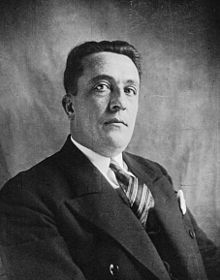Jean-Pierre Mourer

Jean-Pierre Mourer (19 August 1897 in Wittring, Moselle – 10 June 1947 in Île Napoléon, Mulhouse) was an Alsatian politician. He was elected to the French National Assembly in 1928, 1932 and 1936.[1]
A railway employee, Mourer joined the French Communist Party and was elected to parliament in April from the second constituency of Strasbourg. In a second round of voting, he defeated Georges Weill by 7,140 votes against 6,013.[1] In parliament, he was a member of the committees on Algeria, colonies and protectorates, liberated regions, hygiene and economy.[1]
Mourer was expelled from the French Communist Party in July 1929. In October 1929, he became one of the leaders of the Opposition Communist Party of Alsace-Lorraine.[2]
In the 1932 election, he defeated the socialist Marcel-Edmond Naegelen with 6,575 votes against 6,192 in the second round.[1]
In the 1936, he was re-elected in the second round with 5,844 votes.[1]
In the autumn of 1939, he was arrested along with other prominent Alsatian autonomists. In 1940, he was freed by German forces,[1] and was appointed as the Kreisleiter (Chief Administrator) of the Mulhouse district by the German authorities.[2][3] His appointment as Kreisleiter materialized in spite of reservations from the Gestapo, who were reluctant to see a former communist occupy such a strategic office. During this period, he Germanized his name to 'Hans Peter Murer'.[4]
Murer was arrested by American forces in Munich in August 1945. He was detained at Bad Mergentheim, and was later handed over to French authorities and imprisoned at Mulhouse jail.[4]
After the war, the Court of Justice of Haut-Rhin sentenced him to death on 26 February 1947 for collaboration with the Germans. He was executed by a firing squad, headed by De Torres, on 10 June 1947, on Île Napoléon.[4][5][6]
Notably, evidence in Mourer's case focused primarily not on collaboration during the occupation itself but rather on the contacts he allegedly had with Germany prior to the war.[7]
References
[edit]- ^ a b c d e f Mourer (Jean Pierre)[permanent dead link]
- ^ a b Goodfellow, Samuel. From Communism to Nazism: The Transformation of Alsatian Communists, in Journal of Contemporary History, Vol. 27, No. 2 (Apr., 1992), pp. 231-258
- ^ Wieviorka, Olivier. Orphans of the Republic: The Nation's Legislators in Vichy France. Cambridge, Massachusetts: Harvard University Press, 2009. p. 140
- ^ a b c Jean-Pierre Mourer (1897 - 1947)
- ^ Wieviorka, Olivier. Orphans of the Republic: The Nation's Legislators in Vichy France. Cambridge, Massachusetts: Harvard University Press, 2009. p. 328
- ^ Béné, Charles. L'Alsace Dans Les Griffes Nazies. Raon-l'Étape: Fetzer, 52, rue Jules-Ferry, 1971. p. 272
- ^ Raise the white flag: Conflict and collaboration in Alsace
- 1897 births
- 1947 deaths
- People from Moselle (department)
- Politicians from Alsace-Lorraine
- Politicians from Grand Est
- French Communist Party politicians
- Proletarian Unity Party (France) politicians
- Alsatian Workers and Peasants Party politicians
- Nazi Party politicians
- Members of the 14th Chamber of Deputies of the French Third Republic
- Members of the 15th Chamber of Deputies of the French Third Republic
- Members of the 16th Chamber of Deputies of the French Third Republic
- Kreisleiter
- Executed French collaborators with Nazi Germany
- French politicians convicted of crimes
- Executed politicians
